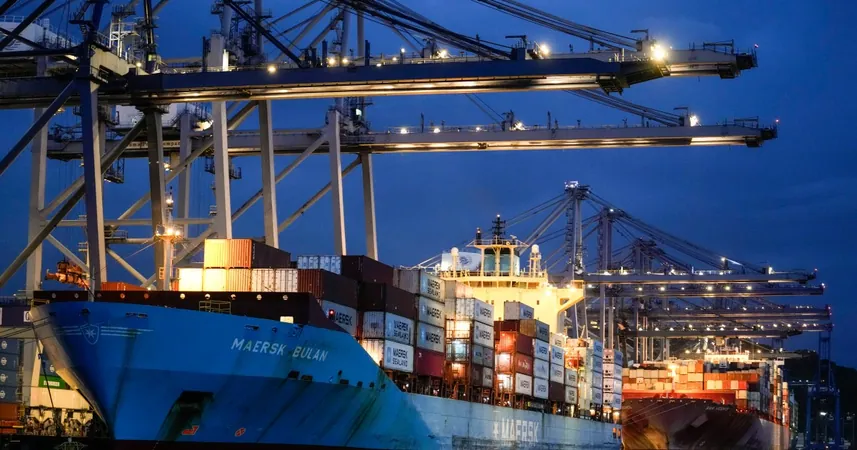
Why China is Up in Arms Over the Potential Sale of Two Key Ports in the Panama Canal
2025-04-01
Author: Kai
CK Hutchison, a colossal Hong Kong-based conglomerate, recently announced plans to sell its stake in two crucial ports on the Panama Canal to a consortium of US investors led by BlackRock. This bold move is part of a staggering $22.8 billion deal that would give the investors control over more than 40 ports across 23 countries. This announcement has sparked outrage in China, particularly due to the ongoing tensions surrounding control over significant shipping routes that are geopolitically vital.
The controversy intensified following statements by former US President Donald Trump, who claimed that the strategic Panama Canal was under excessive Chinese influence. CK Hutchison's stock rose sharply after the deal was made public on March 4. However, just days later, shares plummeted following scathing criticism from *Ta Kung Pao*, a state-run newspaper that accused the company of "betraying" Chinese interests.
As the April 2 deadline approached for finalizing this deal, CK Hutchison found itself in a precarious position caught between the competing interests of Washington and Beijing. Commentary suggests that China is keen to block this sale for several reasons:
1. National Pride and Strategic Interests
Editorial pieces in *Ta Kung Pao* reflect the sentiment of the Chinese Communist Party, signaling the government's disapproval of what it sees as a significant setback in its influence over critical international trade routes. Hong Kong's leader, John Lee, echoed these sentiments, emphasizing the need for "serious attention" on the transaction.
2. Xi Jinping’s Displeasure
Reports from *The Wall Street Journal* indicate that even President Xi Jinping is reportedly dissatisfied that CK Hutchison didn't seek his approval for the deal. There are rumors that Xi viewed the port sale as a bargaining chip in negotiations with Trump, who had expressed intentions to reclaim control over the Panama Canal.
3. Antitrust Investigations
In light of this deal, China's market regulator has announced a potential antitrust investigation to ensure fair market competition is upheld. There is speculation that this investigation could serve as a deterrent against CK Hutchison proceeding with the transaction.
CK Hutchison’s Complex Relationship with Beijing
The dynamics between CK Hutchison and the Chinese government run deep. The company's founder, Li Ka-shing, once enjoyed a close relationship with Chinese leaders during China's economic reform era. However, as political tides shifted, particularly with Xi's rise to power, Li’s political capital has diminished.
With Li transferring control of his vast empire to his son years ago, the family's public image has shifted toward more global business pursuits, distancing itself from the political scene. Despite divesting many investments from China, CK Hutchison still derives a significant portion of its revenue from the mainland. This reliance makes them vulnerable to Beijing's influence; essentially, they are caught in a web of geopolitical tensions.
Will Beijing Succeed in Halting the Deal?
Analysts note the legal challenges that Beijing may face in attempting to block the sale. The companies and ports involved are not directly under Chinese jurisdiction, which could make it tricky for regulators to enforce their will. However, the threat of investigations and political pressure looms large.
For instance, the Chinese government could leverage CK Hutchison's existing business interests in mainland China as a soft form of coercion. Although the conglomerate has pivoted away from some investments in China, its remaining stakes could led China to retaliate against the firm should the port sale proceed.
Looking Ahead: A Pivotal Moment in a Heightened Trade War
As we approach the April 2 deadline, the fate of the CK Hutchison sale remains uncertain. There are whispers that the Hong Kong government may not intervene, yet Beijing is employing a mixture of soft and hard tactics in response to the deal. Recent reports indicated that state-owned enterprises had been instructed to refrain from new business with CK Hutchison, putting further pressure on the conglomerate.
Additionally, though CK Hutchison continues to keep its cards close to its chest, the deal reportedly carries a 145-day exclusivity clause that permits a shift in negotiations if initial discussions stall.
The increasingly politicized nature of this transaction encapsulates the broader Sino-American trade war while revealing how corporations can inadvertently become pawns in larger geopolitical conflicts. In an age where economic and political landscapes continue to converge, the scrutiny on CK Hutchison underscores just how high the stakes are for international business operations in an era of rising tensions.




 Brasil (PT)
Brasil (PT)
 Canada (EN)
Canada (EN)
 Chile (ES)
Chile (ES)
 Česko (CS)
Česko (CS)
 대한민국 (KO)
대한민국 (KO)
 España (ES)
España (ES)
 France (FR)
France (FR)
 Hong Kong (EN)
Hong Kong (EN)
 Italia (IT)
Italia (IT)
 日本 (JA)
日本 (JA)
 Magyarország (HU)
Magyarország (HU)
 Norge (NO)
Norge (NO)
 Polska (PL)
Polska (PL)
 Schweiz (DE)
Schweiz (DE)
 Singapore (EN)
Singapore (EN)
 Sverige (SV)
Sverige (SV)
 Suomi (FI)
Suomi (FI)
 Türkiye (TR)
Türkiye (TR)
 الإمارات العربية المتحدة (AR)
الإمارات العربية المتحدة (AR)